Singer-songwriter and guitarist David Crosby, known as a piloting force behind the folk-rock movement of the 1960s and ’70s, has died at the age of 81. Details on the cause of his death, which occurred on Wednesday, January 18, have not been disclosed to the media, but his wife Jan Dance has stated that he had been battling a “long illness.” He’s survived by Dance, their son Django, and his children of previous relationships: son James Raymond, and daughters Erika and Donovan Crosby. (He was also the biological father of Melissa Etheridge and Julie Cypher’s two children, Beckett Cypher, who passed in 2020, and Bailey Jean Cypher.)
Crosby, Stills, Nash & Young - Almost Cut My Hair
Crosby, a founding member of the Byrds and supergroup Crosby, Stills, Nash & Young, was defined by his unmistakable, timeless—and preternaturally physically enduring—voice, which, combined with his songwriting, shone through the throngs of his talented contemporaries to make him an icon. Often pictured with a coy, impish smile, he was characterized by his incorrigibility, perseverance, and brazen outspokenness on politics as well as his personal opinions. Inducted into the Rock & Roll Hall of Fame twice—as a member of the Byrds and Crosby, Stills & Nash (the group’s original iteration)—he helped mold his era’s musical zeitgeist into something that demanded longevity, and in doing so contributed to forging the grammar that continues to be spoken by today’s folk artists.
As a child, Crosby had a reputation for being a bit of a rebellious loner with a distrust of authority. At 16, his older brother Ethan gave him his first guitar. Ethan also shared with him a love for ’50s jazz, and Crosby became enraptured by artists like Chet Baker, Dave Brubeck, and Erroll Garner. Indifferent to the ubiquitous strains of Elvis and nascent rock ’n’ roll, he was drawn instead to the music of the Everly Brothers, whose “All I Have to Do Is Dream” was one of the first pop tunes to leave a lasting impression on him. Later in his youth, after dropping out of his drama studies at Santa Barbara City College, he moved to New York City’s Greenwich Village—the beating heart of the early-’60s folk scene—where he soon became connected to Jim McGuinn (who later changed his name to Roger).
The Byrds formed in 1964, with a sound driven by McGuinn’s jangly 12-string guitar and Crosby’s harmonies and rhythm playing. They released their seminal cover of Bob Dylan’s “Mr. Tambourine Man” on their debut album of the same name in ’65. By the following year, their cover of Pete Seeger’s “Turn! Turn! Turn!” was among the three biggest singles on the charts (the others were the Rolling Stones’ “Satisfaction” and the Beatles’ “Yesterday”). On their third album, Fifth Dimension, Crosby's writing contributions—including his personal composition, “What’s Happening?!?!,” and co-writing credits on songs such as “Eight Miles High”—pointed the group in a psychedelic direction (along with the McGuinn-penned title track).
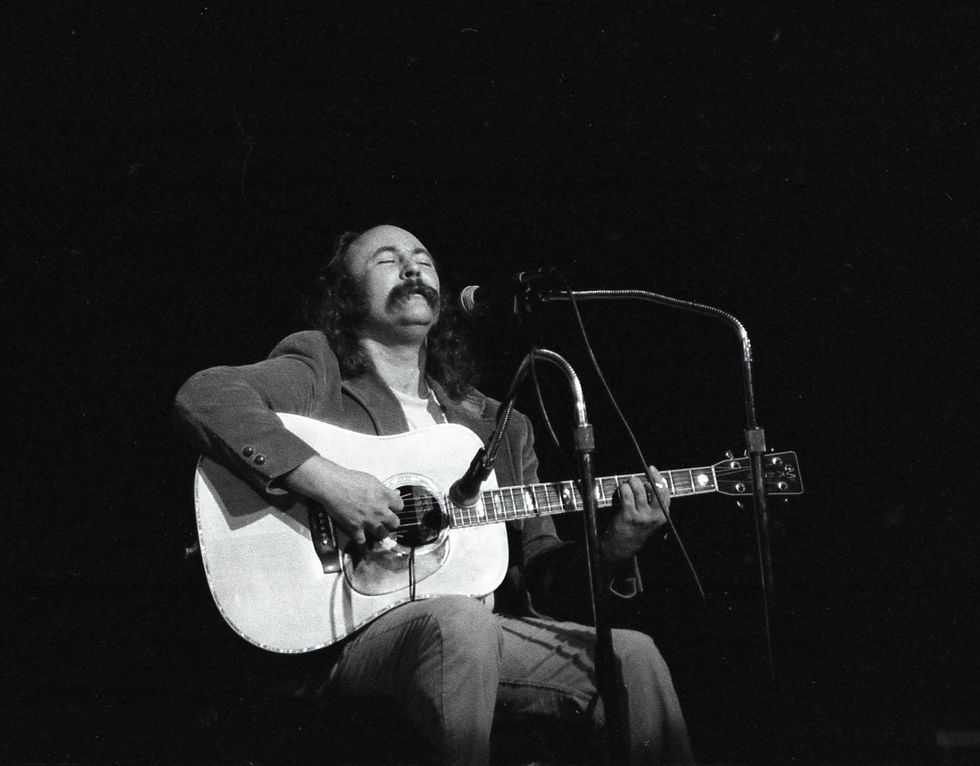
The acoustic guitarist was inimitable in his songwriting, which blended innately with the voices of Stephen Stills, Graham Nash, and Neil Young.
Photo by Frank White
But as Crosby comments in the 2019 documentary, David Crosby: Remember My Name, “It’s not always a positive thing when you win early and win young.” Tension between McGuinn and Crosby had been intensifying over the years, and by the time of their performance at the inaugural Monterey Pop Festival in ’67, McGuinn had grown to see Crosby as insufferable. “[I was] not easy. Big ego. No brains,” Crosby admits. His vocal endorsement of political conspiracies on stage during their performance only fanned the flames between the two men, and later that year McGuinn and bassist Chris Hillman fired Crosby from the band.
That year still proved to be a busy one for Crosby. He helped Joni Mitchell get signed to a record label and produced her first record. He also joined Buffalo Springfield for a brief stint before they broke up in ’68. Crosby and Buffalo Springfield’s Stephen Stills suddenly both found themselves unemployed and began jamming together. They were joined shortly thereafter by Graham Nash of English pop group the Hollies.
“Whatever sound Crosby, Stills & Nash has was born in 40 seconds,” Nash said in 2013. Their self-titled debut was released in 1969, and featured Crosby’s “Guinnevere,” as well as the first song he wrote with Stills, “Wooden Ships.” Its introduction of the three singer-songwriter-guitarists’ converging talents, gilded by their gently interwoven harmonies and Crosby’s alternate tunings, emblazoned a new face onto the already flourishing folk landscape. On Crosby’s invitation, Neil Young—another former member of Buffalo Springfield, who had two solo records to his name—was soon after added to the trio, and CSN became CSNY. Their second-ever performance was at Woodstock later that year, where a candid Stills told the audience, “We’re scared shitless.”
[Crosby, Stills & Nash’s] introduction of the three singer-songwriter-guitarists’ converging talents, gilded by their gently interwoven harmonies and Crosby’s alternate tunings, emblazoned a new face onto the already flourishing folk landscape.
Their first album as a quartet, Déjà Vu, shot to the top of the charts (to date, it has sold over 7 million copies). It’s rounded out by two of Crosby’s compositions, the counterculture anthem “Almost Cut My Hair” and the jazz-imbued title track.
I have memories of where I’ve been when listening to many of the albums that have left as indelible an imprint on me as Déjà Vu, but unlike almost any other one I can think of, I remember exactly when and where I was when I first heard it. (I then quickly set “Carry On” to be my morning alarm, and was thusly woken up to the lyrics, “One morning, I woke up.…” for at least a year.) As a former music teacher, I’ve also had the privilege of witnessing the awe on young students’ faces when I’ve shared with them “Almost Cut My Hair,” where Crosby leads with a restrained yet angry rawness to his voice, sans harmonies.
But in late 1969, the death of Crosby’s longtime girlfriend Christine Hinton sent him spiraling into cocaine and heroin addiction, the former of which had been developing throughout his career. A little over a year later, Crosby released his debut solo album, If I Could Only Remember My Name, to mixed reviews, Meanwhile, CSNY didn’t record another studio album together until 1977. Then, in the early ’80s, he was convicted of bringing cocaine and a loaded pistol into a Dallas nightclub. He ran from the law for two years before serving five months in prison—four of them in solitary confinement.
His time spent in prison, which sobered him up from hard drugs, renewed Crosby’s resolve as a songwriter. He released two more solo records, 1989’s Oh Yes I Can and 1993’s Thousand Roads, and in the ’90s, was united with his son, pianist James Raymond—who had been given up for adoption 30 years prior—and guitarist Jeff Pevar to form the tongue-in-cheek-named CPR. CSNY became CSN again for a few more releases, then reformed as a quartet with 1999’s Looking Forward. They continued to perform until their disbandment in 2015, but, by then, their relationships had become fraught, and the split felt long overdue.
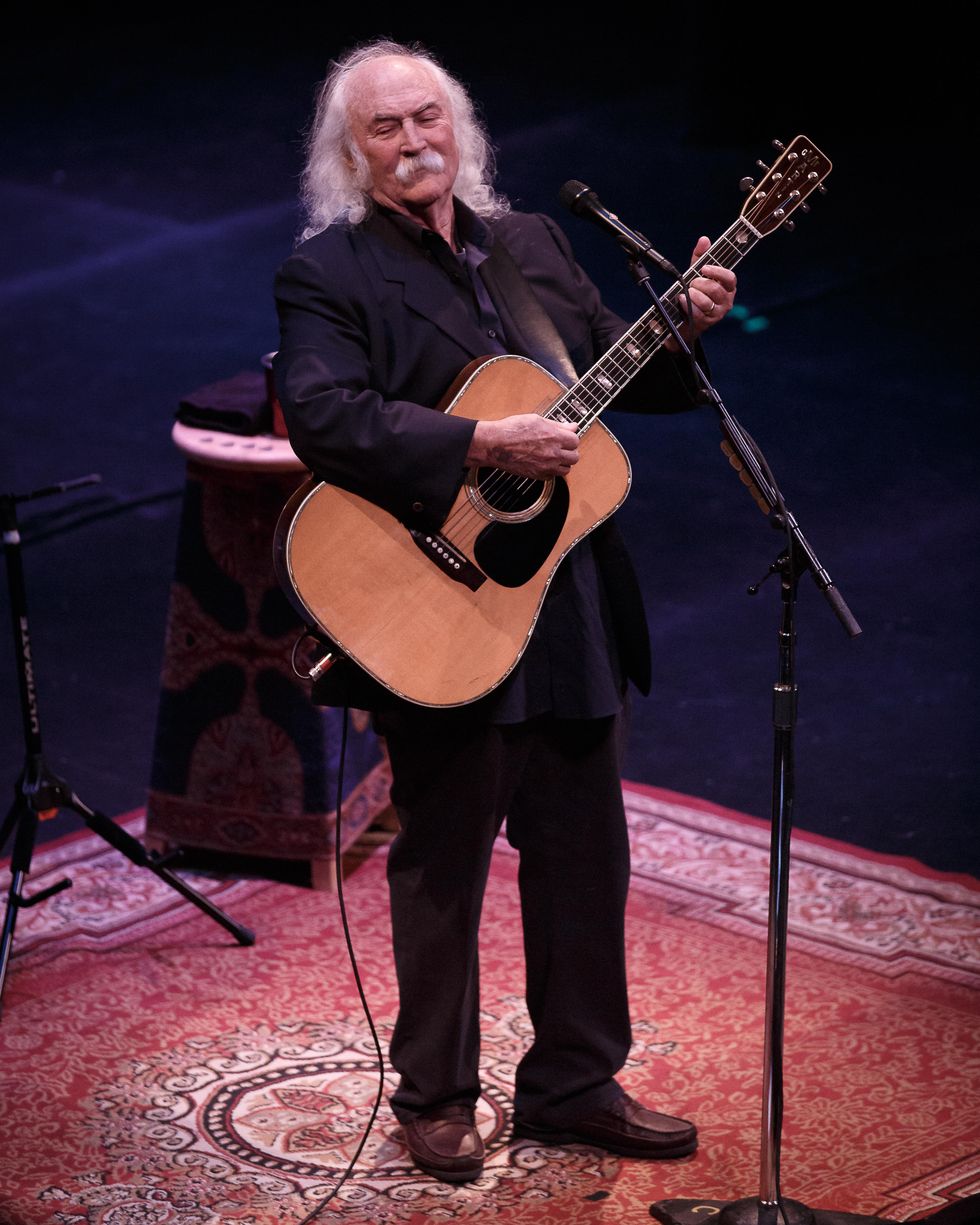
Early on his career, Crosby developed a reputation not just for his vocal harmonies, but for his adventurous alternate tunings.
Photo by Steve Kalinsky
In 2014, Crosby returned for what became the most prolific period of his solo career with Croz, which, as his first work in this vein in 21 years, made the Top 40. He put out four more albums over the next seven years. 2018’s Here If You Listen was recorded with Michael League, Becca Stevens, and Michelle Willis, and his final release, 2021’s For Free, was named after his cover of Mitchell’s song, ”Real Good for Free.“
I have memories of where I’ve been when listening to many of the albums that have left as indelible an imprint on me as Déjà Vu, but unlike almost any other one I can think of, I remember exactly when and where I was when I first heard it.
Following the announcement of Crosby’s death, Nash posted a statement on social media, saying “[Crosby’s] harmonic sensibilities were nothing short of genius. The glue that held us together as our vocals soared, like Icarus, towards the sun. I am deeply saddened at his passing and shall miss him beyond measure.”
Young, from whom Crosby had become estranged in 2014, commented, “Crosby was a very supportive friend in my early life, as we bit off big pieces of our experience together. David was the catalyst of many things.… I remember the best times!”
When asked by producer Cameron Crowe in Remember My Name if, given the choice, he would take the gift of a (more) fulfilling family life but have to sacrifice his music, Crosby at first paused. He then answered, “That’s no world for me. It’s the only thing I can contribute, the only place I can help.” That, hopefully, is how he will be remembered.


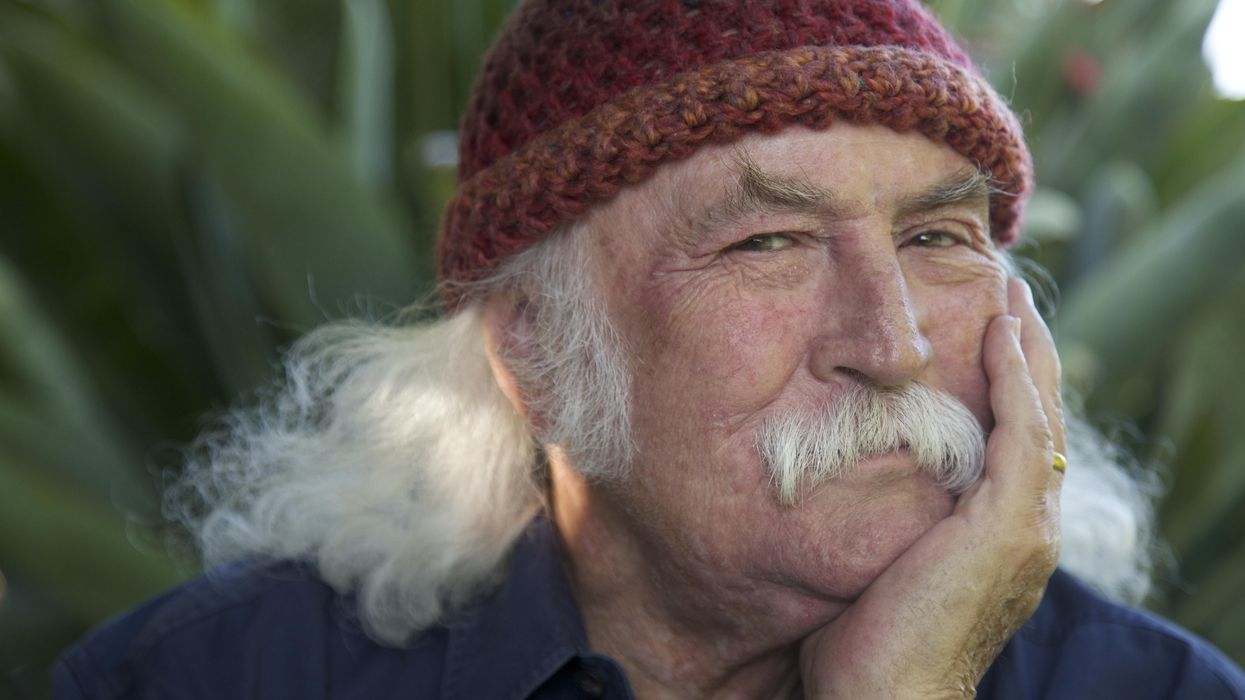










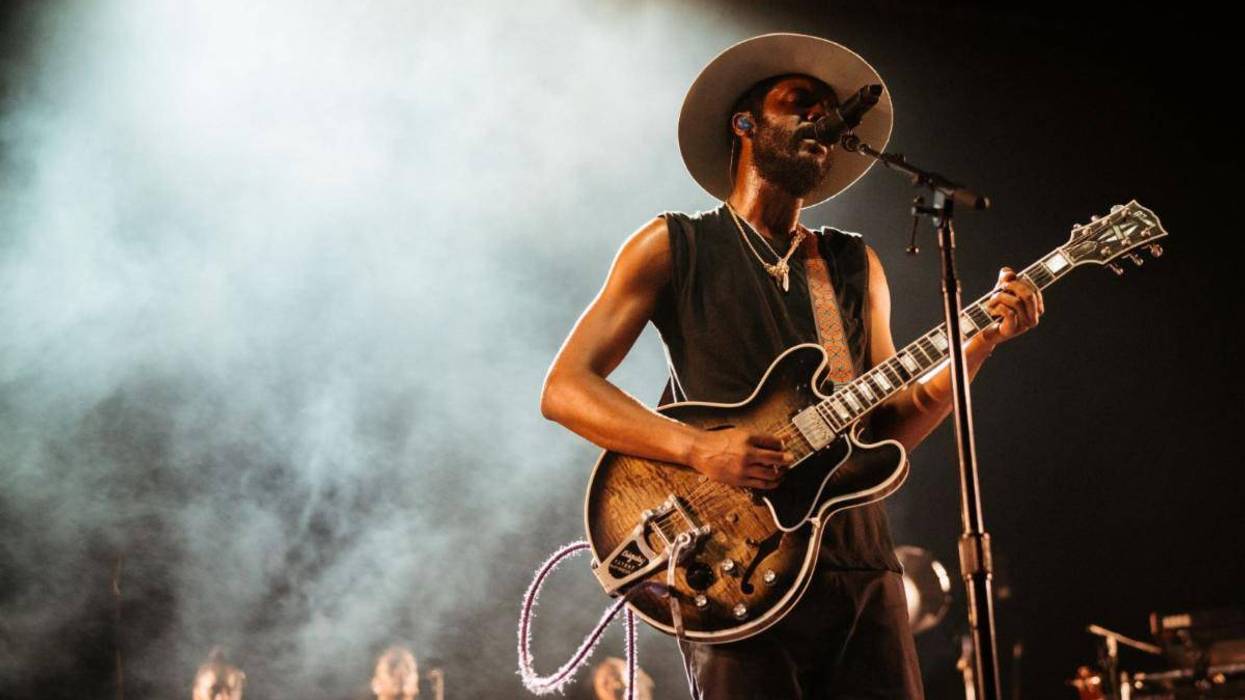
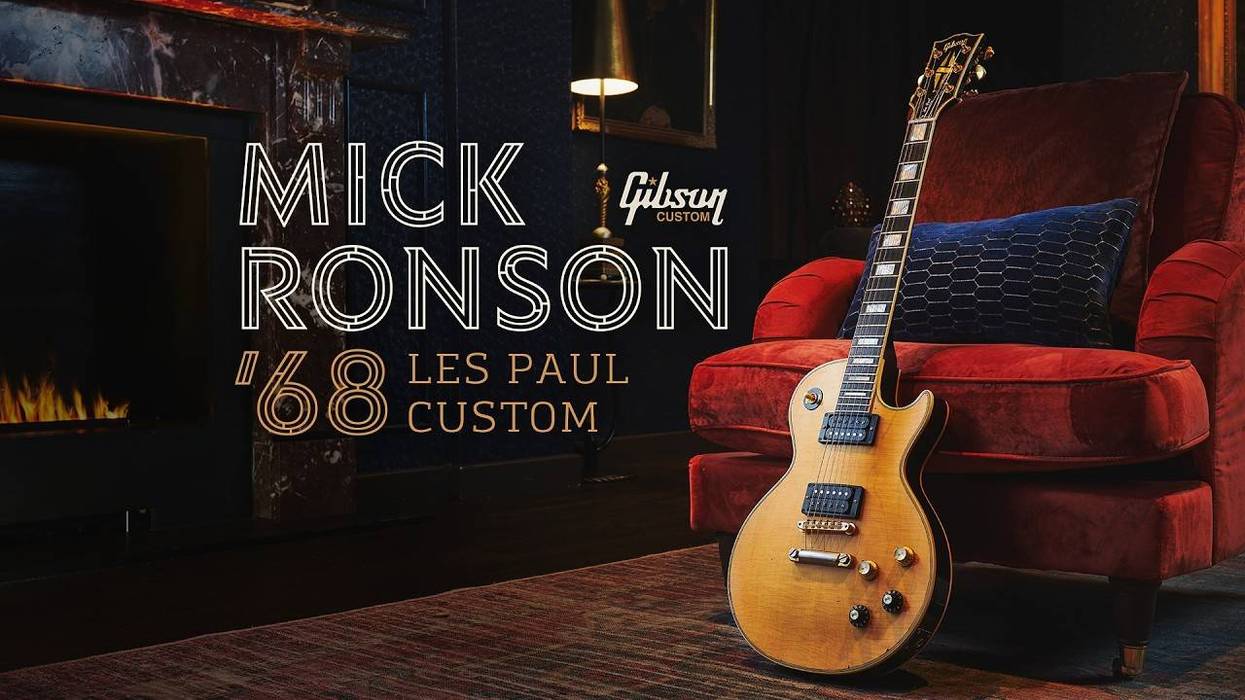





![Rig Rundown: Russian Circles’ Mike Sullivan [2025]](https://www.premierguitar.com/media-library/youtube.jpg?id=62303631&width=1245&height=700&quality=70&coordinates=0%2C0%2C0%2C0)






